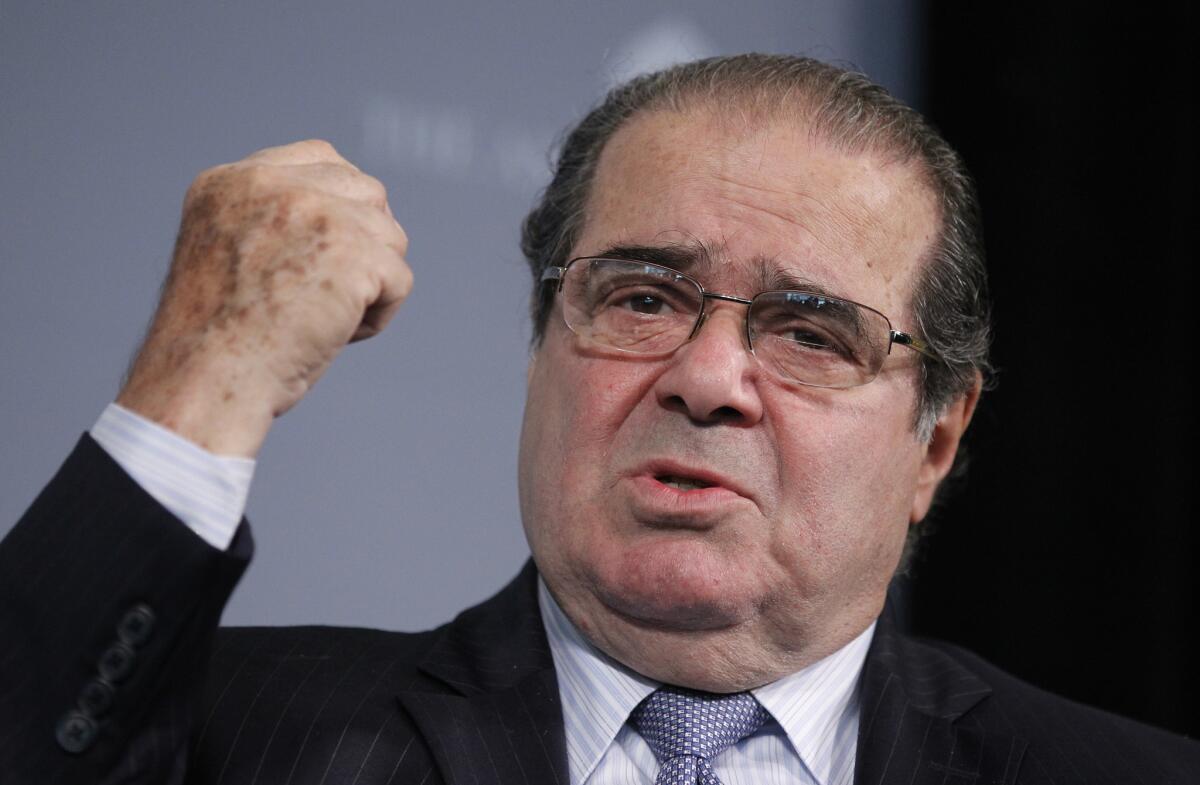Op-Ed: Justice Scalia kept constitutional originalism in the conversation — no small legacy

Supreme Court Justice Antonin Scalia participates at the third annual Washington Ideas Forum at the Newseum in Washington in October 2011.
- Share via
“I’m Scalia.” That’s how Justice Antonin Scalia began to question a nervous lawyer, who was mixing up the names of the nine Supreme Court justices during oral arguments on the controversial 2000 case Bush vs. Gore. His introduction should have been unnecessary, because if any justice dominated the contemporary Supreme Court stage, it was Scalia.
By turns combative, argumentative and thoughtful, Scalia was a stout conservative who transformed American jurisprudence in 34 years on the bench. He was also charming, witty and cordial, able to maintain a close friendship with Justice Ruth Bader Ginsburg, perhaps his leading intellectual rival on the Supreme Court’s left wing.
Appointed to the federal appeals court in Washington, D.C., by President Reagan in 1982, Scalia was elevated by Reagan to the Supreme Court in 1986. Scalia was, first and foremost, an “Originalist” — the title of a popular play about the justice that premiered last year in the capital. Scalia was not the first to argue that the Constitution must be applied based on the original meaning of its words — that is, the general, public meaning those words had when that document was drafted, rather than any assumed or secret intent of its framers. He did, however, supply much of the intellectual power behind the movement to reestablish the primacy of the Constitution’s actual text in judging.
With Scalia on the bench, academics, lawyers and jurists left, right and center were forced to confront originalist theory, which many had previously dismissed as hopelessly simplistic.
If there was one predominant thread running through Scalia’s cases it was a determination, consistent with his originalism, to limit the unelected judiciary’s power to the exercise of “merely judgment,” as characterized by Alexander Hamilton in a Federalist Papers passage that Scalia loved to quote. His view of the proper judicial role was driven by his belief that the Constitution assigned judges a modest part to play, both as to the types of issues they could resolve and the instances in which they could overturn choices made by elected officials.
Although the Constitution took disposition of some issues off the political table, Scalia understood that it nevertheless established a republic where on most matters the majority would rule. Individual liberty, he believed, was protected not only by specific guarantees in the Bill of Rights, but also by the system of checks and balances—limitations on the authority vested in government and the structural separation of powers among the three federal branches, as well as between the federal government and the states.
Indeed, Justice Scalia did as much or more to limit the scope of judicial power than any of his predecessors, particularly with respect to “standing” (who might have a sufficient case or controversy to litigate in federal courts), and his insistence that judges could enforce the law only as written, which could never be trumped by personal policy preferences.
It should come as no surprise that Scalia was not a great coalition builder or deal maker, joining only those majority opinions consistent with his guiding principles and dissenting in all other instances. For him, politicking and judging were simply incompatible.
He bristled at the idea that judges were the custodians of a “living Constitution” whose meaning they could change in accordance with “evolving standards.” As Scalia wrote dissenting from the court’s 2005 death penalty decision in Roper vs. Simmons: “On the evolving-standards hypothesis, the only legitimate function of this Court is to identify a moral consensus of the American people. By what conceivable warrant can nine lawyers presume to be the authoritative conscience of the Nation?”
Few justices could turn a phrase like Scalia, a talented writer. In one famous example, dissenting from a 1988 opinion upholding the now-defunct Independent Counsel Act, Scalia defended presidential power to control executive branch appointees by noting that “frequently an issue of this sort will come before the Court clad, so to speak, in sheep’s clothing.... But this wolf comes as a wolf.”
His pen could also be sharp. Recently, for example, in response to the majority opinion upholding a constitutional right to same-sex marriage, Scalia excoriated his colleagues: “The world does not expect logic and precision in poetry or inspirational pop-philosophy; it demands them in the law. The stuff contained in today’s opinion has to diminish this Court’s reputation for clear thinking and sober analysis.” Love him or hate him, agree or disagree, no one can say that Scalia ever pulled a punch.
Scalia’s ultimate impact on American law will continue to unfold for decades to come, but one thing is certain. Before he joined the Supreme Court, judicial opinions could resolve constitutional issues with little discussion of that document’s original meaning. Today, jurists must at least confront it, even if they then resolve the issues based on the Constitution’s supposed living character. That is Scalia’s achievement, and it is no small thing.
David B. Rivkin Jr. and Lee A. Casey are constitutional lawyers who served in the Justice Department under Presidents Reagan and George H.W. Bush.
Follow the Opinion section on Twitter @latimesopinion and Facebook
More to Read
Sign up for Essential California
The most important California stories and recommendations in your inbox every morning.
You may occasionally receive promotional content from the Los Angeles Times.










